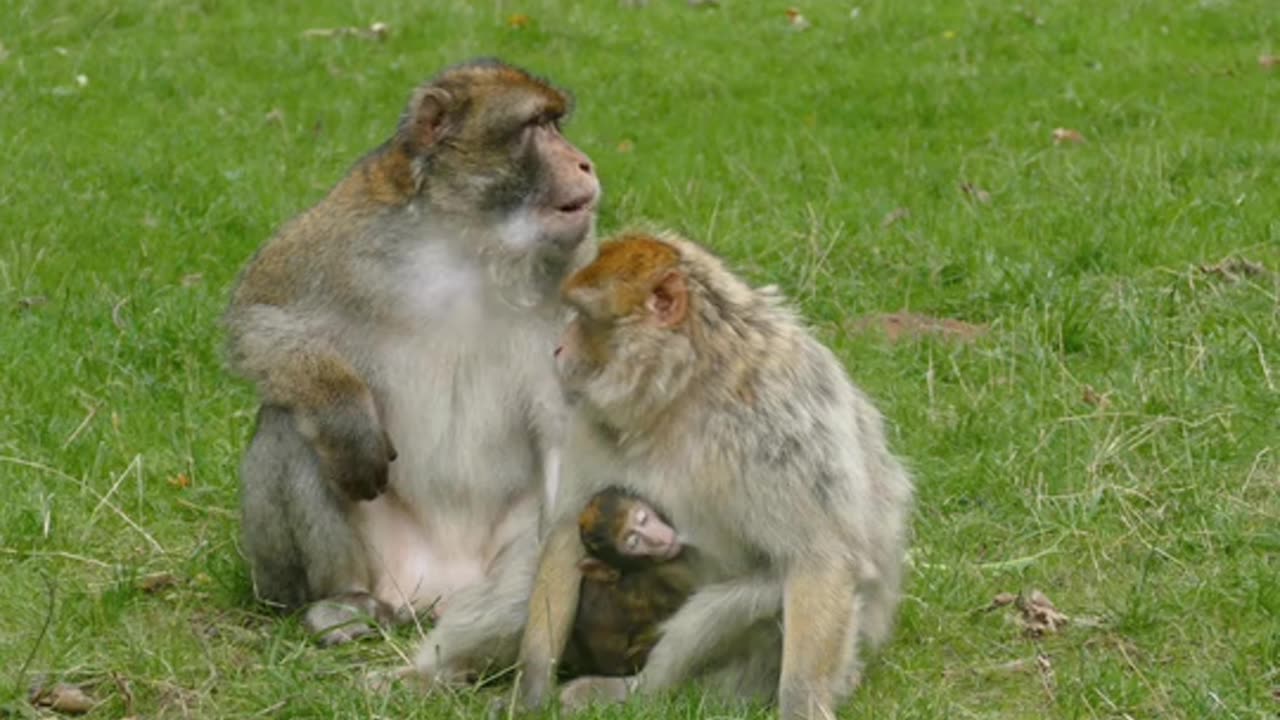Premium Only Content

Funny Monkey Enjoy With Its Friend
Funny Monkey Enjoy With Its Friend
Monkeys are highly social animals, and almost all live in troops consisting of several females with young and either a single male (as in hamadryas baboons, mandrills, most guenons, and most langurs) or several males (as in savannah baboons and macaques). Usually, but not universally, the females stay in the troop in which they were born and are thus closely related to each other. Males join new troops on maturity, and so they are unrelated to each other and somewhat antagonistic. Like humans and apes, female monkeys nurse their young and have a menstrual cycle, albeit less copious. In some species, sexual activity is strictly confined to the period around ovulation (estrus); in others, there appears to be little or no restriction. Some species breed all year round; others have a period several months long during which they experience no sexual cycles (anestrus).
Monkeys have large brains and are known for their inquisitiveness and intelligence. Brain development, combined with the freeing of the hands and well-developed vision, allows them a great latitude of activity. Most are good at solving complex problems and learning from experience, but they do not quite reach the cognitive levels of great apes. Some, especially the capuchins (genus Cebus), spontaneously use objects as tools (e.g., stones to crack nuts). Others, such as baboons, readily learn to use sticks to obtain food. However, in strong contrast to the great apes (gorillas, chimpanzees, and orangutans), most monkeys do not appear to be very good at learning from each others’ experience—individuals more or less have to learn new behaviours for themselves. A significant exception is the Japanese macaque (Macaca fuscata). In field experiments, these monkeys were introduced to new foods such as sweet potatoes and candies wrapped in paper. Once a few individuals had solved the problems of getting at the new foods, their innovations gradually spread throughout entire troops. These experiments have had implications in redefining cultural behaviour.
-
 LIVE
LIVE
Lofi Girl
2 years agoSynthwave Radio 🌌 - beats to chill/game to
842 watching -
 4:33:40
4:33:40
FreshandFit
9 hours agoAfter Hours w/ Girls
235K117 -
 2:33:36
2:33:36
Badlands Media
9 hours agoOnlyLands Ep. 21: From Trump’s VP Pick to Green Energy Grift
68.3K8 -
 1:07:26
1:07:26
Inverted World Live
13 hours agoThe War Against Robots w/ Joe Allen
98.4K5 -
 6:08:31
6:08:31
SpartakusLIVE
12 hours agoWARZONE NUKE IS BACK?! || Solo Challenge CHAMPION to start, duos w/ the Dawg later
102K1 -
 1:00:18
1:00:18
Man in America
14 hours agoBig Pharma’s Empire of Lies Is COLLAPSING as People Turn to Natural Medicine
65.1K23 -
 7:17:44
7:17:44
Drew Hernandez
16 hours agoGHISLAINE MAXWELL SAYS CLAIMS EPSTEIN WAS INTELLIGENCE ASSET ARE BULLSH*T?!
38K38 -
 29:54
29:54
Afshin Rattansi's Going Underground
1 day agoUkraine: Prof. Anatol Lieven SLAMS Europe’s ‘BLOODY STUPIDITY’ as Trump Negotiates with Putin
34.7K6 -
 15:27
15:27
robbijan
1 day ago $2.47 earnedThe Emperor’s New Labubu & The Spiritual War Behind Everything
55.3K43 -
 LIVE
LIVE
GritsGG
21 hours ago36 Hour Stream! Most Wins 3420+ 🧠
682 watching